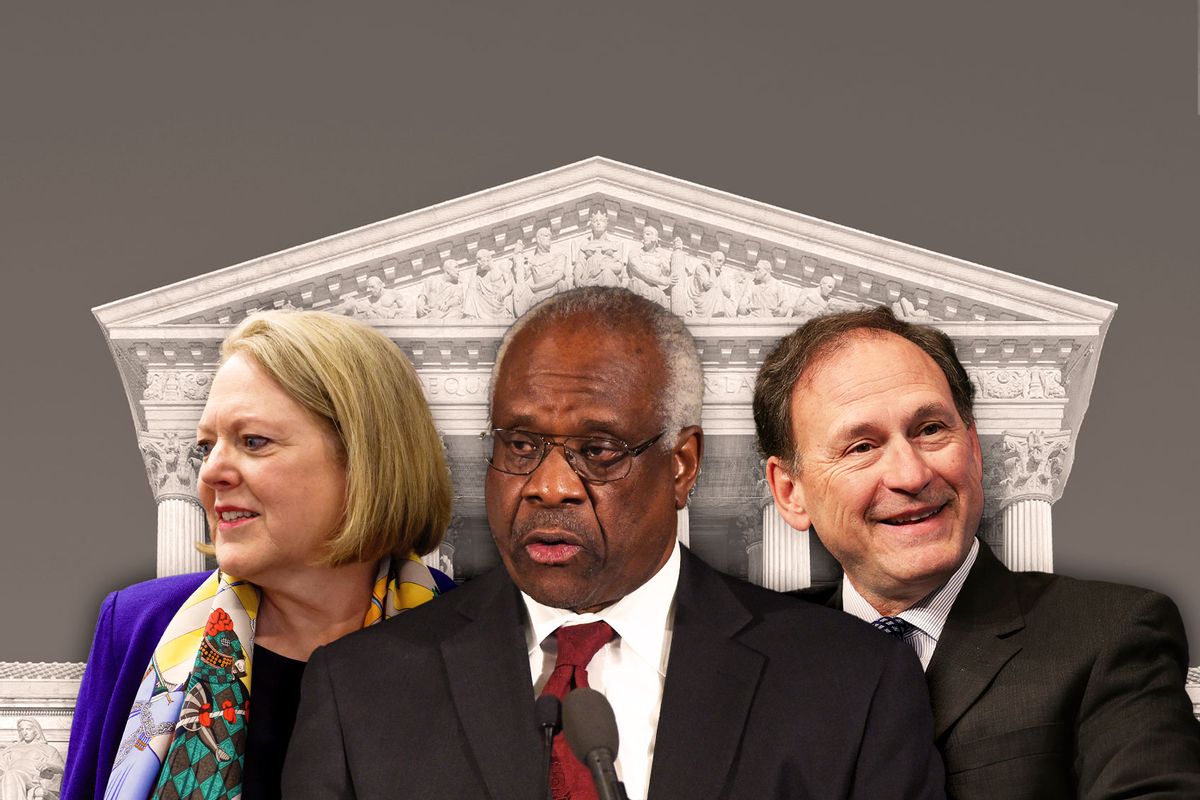Our unelected monarchy makes a joke of our democracy

The foundational pin holding the American rule of law together is that no man is above it.
Early on, when George Washington refused to be king, he did so in recognition of man’s worst instincts. If the colonists embraced another king, free to write the law as he went along, they soon would be right back under lawless control and plunder, a fate too many Patriots gave their lives to escape. It wasn’t “if” early America would fall back under tyranny, the lawless caprice of monarchy, but when.
Despite the historical imperative of assuring that all free governments answer to one rule of law, the U.S. Supreme Court recently announced, with its empty code of ethics, that it answers to no one.
The Supreme Court insulated itself from oversight
Federalists, now a self-proclaimed 6 to 3 majority on the high court, claim adherence to the original intentions of the men who drafted the Constitution, which they tease from a subjectively curated version of history. But no legal scholar has ever seriously questioned whether the drafters intended for the three branches of government they had just created to exist co-equally.By design and text, no branch of federal government- executive, legislative or judicial- was given primacy over another. The powers of each were carefully delineated in the Constitution’s structural components, Articles I, II, and III, which wove an ingenious system of checks and balances among the three.
And yet, today’s “originalist” court rejects the drafters’ original intent to structure co-equal branches of government into perpetuity, by claiming that it stands above and alone. Justice Alito, basking in the largess of guns and big oil, claims Congress is powerless to impose ethics on the Supreme Court. The embarrassing new code of conduct they drafted concurs.
The Court’s reluctant response
The opening statement of the “Code of Conduct” drips with hubris: “The absence of a Code has led in recent years to the misunderstanding that the Justices of this Court, unlike all other jurists in this country, regard themselves as unrestricted by any ethics rules.” Do they really need to behanded up the memo? America’s “misunderstanding” didn’t form in a vacuum. Justices Alito and Thomas don’t just “regard themselves” as unrestricted by ethics, they have so egregiously violated the rules of fair play that they shouldn’t be allowed to serve. They certainly shouldn’t be allowed to impose their 18th century religious views on the nation.
Alito, after all, accepted an expensive Alaskan fishing retreat with Paul Singer, a major GOP donor, fossil fuel investor, and hedge-fund manager with multiple cases before the court. Following the junket, Alito failed to recuse himself from at least 10 cases involving Singer. Alito also voted to dismantle EPA climate protections while his wife was profiting from fossil fuel sales on family land. Right after Mrs. Alito leased her Oklahoma land for oil and gas production, negotiating profits of 3/16ths of the fossil fuel sales, Alito voted to block the EPA from limiting greenhouse gas emissions.
Thomas, for his part, has luxuriated for decades in extravagant gifts from his own conservative benefactor, Harlan Crow, who has spent billions funding cases before the court. Crow, a politically conservative megadonor, lavished Thomas with extravagant gifts valued at millions, which Thomas failed to disclose. Crow directly represented corporate interests that filed briefs in eight different Supreme Court cases, and Thomas supported Crow’s preferred outcome in every single one of them.
While living in the arms of donor largess, Thomas has also repeatedly ruled against donor disclosure requirements. Small wonder. Recall, even the legalized bribery of Citizens United, which allows corporations to buy elections with unlimited campaign contributions, didn’t go far enough for Thomas. He dissented just to issue a scathing tirade against the public’s right to know which uber-wealthy donor contributed how much, to whom, and when.
An aspirational Code of Conduct has no teeth
One of the most glaring deficits of the Court’s new code is its lack of enforcement. Instead of mandating, directing, or using the word “shall,” the code grovels before its own authors, flattering them with meek suggestions that justices “should,” “should not” and might “endeavor to” act in certain ways.
The code only looks forward, not backward, and there are no penalties and no provisions for investigating Alito and Thomas’ conduct anyway. The code fails to create an inspector general, a retired jurist panel, or any other entity with oversight authority over the court, so the members will continue to be their own personal judges.
Another outrageous defect is the lack of recusal, a matter raised consistently after Alito and Thomas ruled in favor of their benefactors and self interests, and after Thomas flat out refused to recuse himself from a case involving Trump’s efforts to stay in power, a cause his wife, Virginia, was deeply involved in. While the Federal law on recusal mandates recusal in conflicts like these, this code merely says the justices “should” disqualify themselves.
Given that Alito and Thomas are in bed with the deadly NRA and fossil fuel agendas, their refusal to recuse in climate and gun cases has enormous life and death implications. They cherry pick which history to embrace — and overruling decades of precedent to strike down federal abortion protections made clear they make it up as they go along.
It seems we’re under an unelected monarchy after all.

